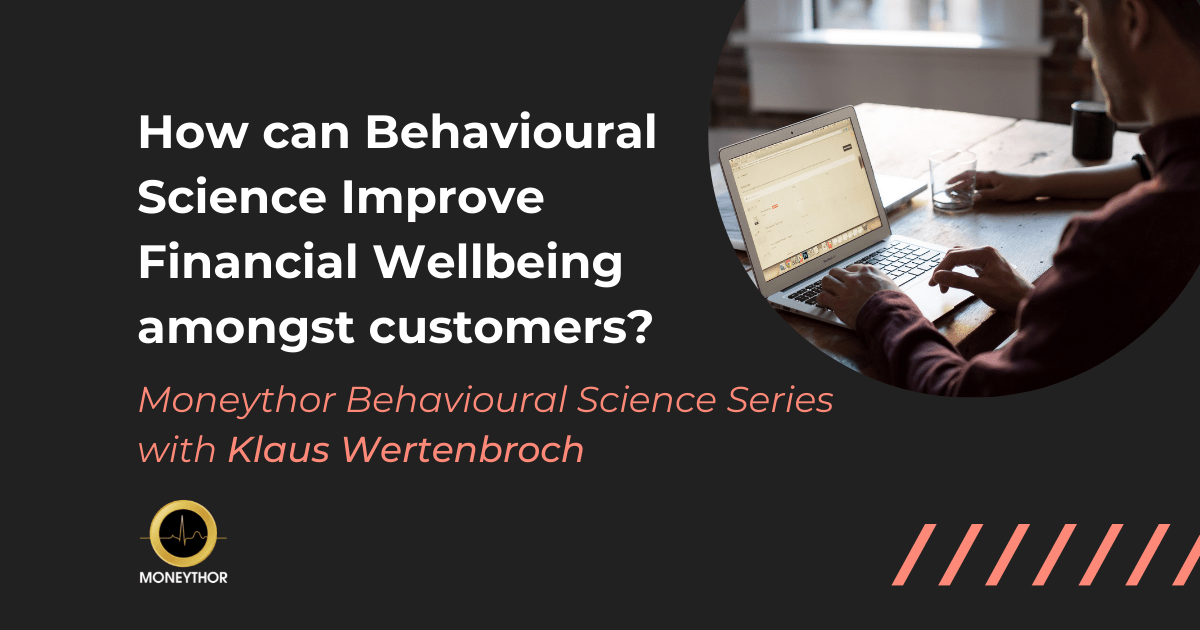Moneythor Behavioural Science Series with Klaus Wertenbroch.
Moneythor’s behavioural science series, a four-part collection of blogs, is based on interviews held with Klaus Wertenbroch, a renowned expert in behavioural economics and consumer-decision-making. In this series we will be delving into the topic of behavioural science in financial services, it’s benefits and pitfalls, the impact it can have on the financial wellbeing of customers and the role it will play in the future of banking.
Part 2 – The Benefits and Pitfalls of Behavioural Science in Banking
Part 3 – How can Behavioural Science Improve Financial Wellbeing amongst customers?
Financial wellbeing is a topic of growing importance in the financial services space. Many banks are now providing tools and advice that support customers and help them lead healthier financial lives. The benefits of this are numerous: not only do financially secure customers save and invest more, but they also tend to be more profitable customers for banks. Coupled with the application of behavioural science principles, these tools can deliver experiences that improve customers’ financial decisions and therefore their overall wellbeing.
How can behavioural science encourage better financial wellbeing amongst customers?
According to Wertenbroch, one of the advantages of applying behavioural science to financial services is that “behavioural science has shown how people’s actual behaviour deviates from the norms of rational choice in economics. Thus, people make systematic mistakes that prevent them from achieving optimal outcomes for themselves. Those mistakes are hardwired into human cognitive processes.” For banks, understanding the limitations of human decision-making is one of the first steps in building experiences that promote financial wellbeing and encourage effective financial decision-making.
Building on the idea of encouraging better financial decision making, Wertenbroch notes that it can often be the small points of friction that have the biggest impact. “One major challenge is that it is often seemingly insignificant, small obstacles that prevent customers from making financial choices that could yield big payoffs in the long term. These small obstacles, such as complicated login processes or overly complex designs of websites, may seem negligible when it comes to financial decisions, but they create so-called friction, which blocks customers from checking their accounts more frequently or from getting started with saving for retirement.”
He adds “customers simply don’t make optimal trade-offs between the small current effort required to overcome small obstacles and the much larger future benefits”. He notes that this is because of present bias, which is the tendency of people to discount their future preferences in favour of more immediate gratification.
In order to overcome these issues, banks can encourage better financial decisions and choices by “recognising and removing friction points from the technology platforms, on which customers interact with banks,” noting this as an important aspect of integrating behavioural science techniques.
How to leverage friction points?
While friction can have a negative impact on customer decisions, it can also be used to provoke positive behaviours from customers. “The idea of friction can also be used to discourage customers from making choices that they may later regret. For example, as credit card customers get closer to their credit limits, they could be sent an extra message on their phones that reminds them of their current balance and their remaining credit and that requires them to tap a button to approve the purchase. This creates a small amount of friction to prevent consumers from making a potentially harmful financial choice.”
When it comes to customer wellbeing in financial services, behavioural science tactics and principles when used correctly, can enhance the customer experience and guide customers to make better financial decisions and choices.
Check out part 4 of the series here
About Klaus Wertenbroch
Klaus Wertenbroch is a Professor of Marketing and Novartis Chaired Professor of Management and the Environment at INSEAD, one of the world’s leading and largest graduate business schools. Wertenbroch is an expert in behavioural economics and consumer-decision-making.


